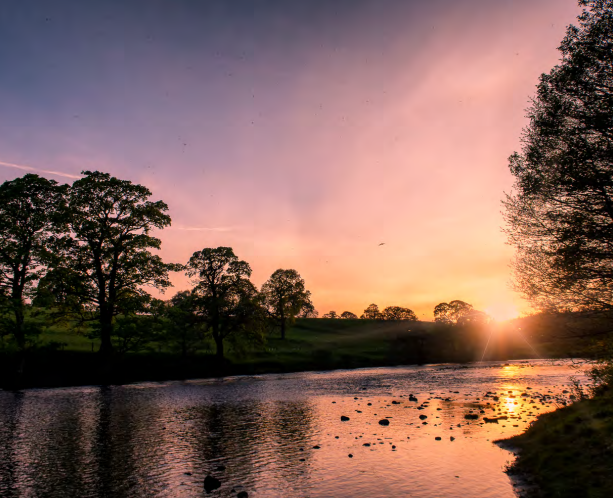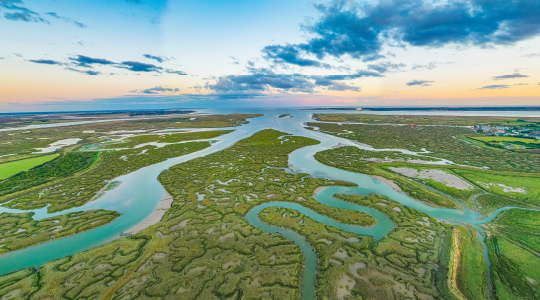
Hello Bishop Auckland
Thank you to everyone who attended our event.
Working hard with partners and local people in their communities, we are restoring and regenerating our natural environment, creating an even better place to live and work through our local actions.
Our Local Environment. Our Ambition. Our Local Action.
Our goal is to prevent pollution and sewage from entering rivers and seas across our region.
- Storm overflows are an important part of our wastewater network because they protect customers’ homes and the environment. They operate automatically as a relief system during heavy rain or storm conditions, or if the sewers are overwhelmed because of more water or blockages and reduce the risk of flooding to streets, homes, and businesses.
- In our next investment plan 2025 to 2030, we want to invest £4.5bn across our business - our biggest ever package to improve water and wastewater services – as we work to reduce the use of storm overflows and improve bathing waters.
- You can see details of our plans along the River Wear
- View our storm overflow information video (opens new window).
- From spring 2025 we will be starting work to reduce the storm overflow frequency around Etherley Lane. Surface water drainage around Barrington Meadows will be improved by constructing approximately 200m of new surface water sewer. A new short length of combined sewer will be built around Dene Hall Drive to maintain existing levels of wastewater service along Etherley Lane. We expect this work will take up to five months to complete.
- You can see how storm overflows work in this video (opens new window).
- At the end of April we launched our digital interactive map (opens new window) to show up-to-date storm overflow information across the region.
- Information on our plan for storm overflows can be viewed on the national storm overflow interactive map (opens new window).
Following planning permission being granted by Durham County Council, Coundon Burn sewer will be modernised and increased in size in the coming months.
- It should take around eight months to renew this important sewer.
- Our Westerton Service Reservoir project is a £2.4m. investment starting in the autumn. It involves us laying 850m of new water pipe from a new pumping station at the junction with the A688, which will add resilience and capacity to the local network. The new main will bypass the Service Reservoir, which was built in the 1920s. Biodiversity is really important to us, and this project will leave the site more environmentally enhanced than we found it.
This is a £155m project to construct 57km of new water mains, connecting Lartington Water Treatment Works with communities across the south of County Durham and across into Teesside.
- Phase 1 is currently under construction, connecting Lartington to Gainford and across to Shildon.
- The work will protect the resilience and quality of water supplies for the future.
- A planning application for Phase 2, which will connect Gainford across to Long Newton, Stockton, will be submitted later this year to Darlington Borough Council and Stockton Borough Council.
The River Wear catchment is the area of land through which water from rain, melting snow or ice, drains into the Wear.
- We are co-funding a full-time Wear Catchment Manager and working with the Wear Rivers Trust; Durham Wildlife Trust and local farmers and land managers to look at managing pollutants in the Wear catchment before they get into the river.
- We’ve been investing at our sewage treatment works to improve the quality of treated wastewater flowing into the River Wear, so that we can play our part in river quality improvements. So far, we’ve invested at seven sites in the Wear catchment area over the past five years to remove pollutants, which can cause excess algae. These improvements will continue with further investment to 2030. We are working hard to create a more sustainable catchment and nature-based solutions, and not rely on concrete and chemicals which cost our customers money and have high carbon emissions.
We need your help, Bishop Auckland.
- Wet wipes are the biggest cause of blockages and sewer flooding.
- You can make a big difference by doing one simple thing, instead of flushing it down the loo, bin the wipe.
Bluespace is a term for rivers, lakes, or the sea that people can access.
- Working hard with local partners, our bluespaces scheme will improve a number of these areas in our region.
- The Wear Rivers Trust and Durham County Council are facilitating volunteer activity to deliver further water environment improvements along the riparian corridor which should encourage positive environmental behaviours and awareness.
- We want local people to propose local bluespaces for improvement. Find out more, including guidance (opens new window) about whether your project might be eligible, or email us at bluespaces@nwl.co.uk.
The Branch Out fund supports local projects that protect local ecosystems by building their resilience to climate change – bringing benefits to local people.
- The link between health and the countryside is well known and many of the Branch Out projects will encourage people to be outside in nature. Enhancing and linking habitats will help local flora and fauna be better placed to deal with climate change.
- If you, or your organisation, are involved in a project doing this, then the Branch Out Fund might be able to help you! Applications for grants of anywhere between £1 - £10,000 are very welcome.
- Read the guidance notes (opens new window) on the sorts of projects that quality for grant funding or email branchout@NWL.co.uk.
We are working hard to tackle the issue of invasive species along the Wear, including in and around Bishop Auckland.
- Invasive species have been introduced by people and have a negative impact on the economy, wildlife, or habitats.
- Specifically, we are providing a total of £32,000 to the Wear Rivers Trust. This support enables experts and volunteers to work on removing harmful species such as Giant Hogweed, Himalayan Balsam, and Japanese Knotweed from local watercourses, ultimately benefiting water quality in the area.
- The Government maintains a list of invasive plants and animals on Schedule 9 of the Wildlife and Countryside Act (opens new window).
Are you passionate about caring for our local waterways and making a difference in your community?
- If you are then why not become a Water Ranger?
- They are an enthusiastic group of local volunteers who roll up their sleeves and take positive local action by reporting any issues and notable wildlife they see in and around our local rivers and streams. Email: waterrangers@nwl.co.uk.
Saving water protects our local environment by limiting the amount of water we must remove.
- We will be encouraging local people to use water wisely and promoting the benefits of water meters.
- A water meter could reduce the amount of water you use by up to 20% saving you an average £264 a year on your bill.
- To find out if a water meter is right for you, why not try our water usage calculator to see if it can save you money.
Even after our planned big investments we still expect bills in the North East to be the lowest in England.
- We know our communities are facing a cost-of-living crisis with food, housing, transport, and other bills going up.
- We are committed to helping those that need it most. If you or anyone you know is struggling to pay their bills, please talk to us. There are lots of ways we can help:
- Try our eligibility checker to find out which of our financial support schemes you may be eligible for.
We think it’s important to give back to make a positive impact in our local communities.
- All our teams at Northumbrian Water are encouraged to volunteer to support community groups and charities through our Just an Hour scheme.
- This important initiative gets our teams out in the communities we serve, putting their shoulders to the wheel of great causes - people choose causes that resonate with them personally - for at least 15 hours a year.
- Find out more about Just an Hour (opens new window).
Find out more
Are you sure?
Changes are waiting to be saved



